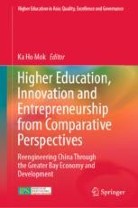Crafting the Future of International Higher Education in Asia via Systems Change and Innovation
Reimagining New Modes of Cooperation in the Post Pandemic

The book series “Higher Education in Asia: Quality, Excellence and Governance” attempts to incorporate the most important higher education issues and current developments in Asian nations from multiple perspectives – academics, university managers, QA bodies, governments and students – into three major dimensions: quality, excellence and governance.
Quality:
The quality of higher education in Asia is a hot topic, especially as students around the world are asked to pay more towards their own education, and expect to get what they pay for. At the same time, the government and higher education institutions are also more attentive to the quality of higher education, facing both quantitative and qualitative challenges, such as increased enrolment, less motivation for student engagement, mismatch between academic curriculums and required competence for securing employability. In addition, quality of cross-border education is a focus of the series due to the increased student mobility in Asia.Excellence:
With the growth of competition between nations, the pursuit of excellence and the creation of world class universities are increasingly important in national agendas in both developing and developed countries. Several excellence programs have been created in Asia to fulfill the objective. In East Asia, China, Japan, Taiwan, South Korea, and Southeast nations developed higher education excellence initiatives so as to build a number of world class universities in a short period of time. The book series encourages researchers to undertake empirical studies of government policies and assess the impacts driven from these competitive initiatives.Governance:
Asian higher education systems are experiencing a fundamental transformation due to economic growth, talent mobility, and international competition. Concurrently, globalization has also accelerated Asian higher education moving into a new era of quality education. On the one hand, Asian government expanded the size of higher education in both number of institutions and enrollment; on the other hand, the public management model, which strengthens governmental control over higher education institutions, is growing its popularity in Asian nations as well. In the era of higher education massification, the public’s desire to maintain and increase both ‘‘quantity’’ and ‘‘quality’’ has placed tremendous pressure on the efficient governance of higher education at the national and institutional levels.Guidelines and Principles
The Book Series adopts internationally established review process. It mainly consists of the following four review phases:1. All proposals and manuscripts will be sent out for external double-blind review.
2. After receiving review reports, the co-editors of the series will further review the comments of external reviewers before forming a decision of acceptance of proposal for publication.
3. Review reports will be shared with proposers and their revisions will be further taken into consideration if a book contract is issued.
4. After receiving the completed manuscript, the co-editors will review the quality of the book and also seek external review in order to ensure quality before formal publication.
Abstracted/Indexed in:
Scopus
Reimagining New Modes of Cooperation in the Post Pandemic
Available Renditions

Reengineering China Through the Greater Bay Economy and Development
Available Renditions

Global, Political and Social Challenges and Future Trends
Available Renditions

Policy, Politics and Progress
Available Renditions

Consequences, Policy Responses and Changing Governance
Available Renditions
